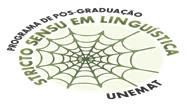Banca de QUALIFICAÇÃO: ROSÂNGELA ANTONINI
Uma banca de QUALIFICAÇÃO de MESTRADO foi cadastrada pelo programa.DISCENTE : ROSÂNGELA ANTONINI
DATA : 04/03/2022
HORA: 13:30
LOCAL: Defesa remota - via webconferência
TÍTULO:
EJA: ONE MODALITY AND MANY MEANINGS: A STUDY OF THE MEANINGS OF EJA “STUDENTS” IN THE LAWS THAT GUARANTEE ACCESS TO THIS MODALITY
PALAVRAS-CHAVES:
Naming, Renaming, ROP, Student, Semantics of Event.
PÁGINAS: 120
GRANDE ÁREA: Lingüística, Letras e Artes
ÁREA: Lingüística
SUBÁREA: Teoria e Análise Lingüística
RESUMO:
The history of education in Brazil, first, is presented as a forgotten place in America, which only started
to make sense after the arrival of the Portuguese; although when the Portuguese fleets arrived here,
this vast territory was occupied by its natural inhabitants, who had a culture, a cuisine; they spoke
various dialects, practiced the art of hunting and fishing, and built a calendar for the rituals
that marked the festivities. With the arrival of the new element “the European”, this routine was transformed
by the new Western customs. Since then, various elements have been introduced in the lives of
indigenous peoples. With the discovery of the lands of the new world, there was a need to colonize and so,
the first educators came in the caravels; the Jesuit priests of Christian philosophy with an evangelizing objective,
in order to make the Indians more docile and, therefore, submissive to the new order in force in
the Brazilian colony. The first seeds on education are then sown, which soon germinated in the integration
of the children (Indians) of the colony to receive the Catholic faith. This relationship between the Church
and the first inhabitants, the Portuguese and the colonizers, was not always harmonious, as there were
many interests in that nucleus of coexistence that at certain points generated conflicts. However, education
was never neutral and was linked to the interests of the Crown, the Church and the colonizers who wanted
to pacify the Indians through religion, which was not always possible; this means semantically a dispute
in this political space of forces involved in the clash of ideas and interests. It is in this way that we will focus
on the history of Brazilian education, in the analytical process that means and (re)signifies in/through l
anguage through the functioning of language in/through enunciation. Therefore, the development of this
research will be based on the history of ideas in education from the arrival of the first educators who were
the priests of the Companhia de Jesus, to the establishment of the Youth and Adult Education Centers (CEJAs)
in Mato Grosso, a space for identity constitution of young people and working adults who did not have
the opportunity to finish their studies at their own age. As education was being constructed by
the subjects who wrote the story, it means semantically that the education of young people and adults
in Mato Grosso was designed to correct a gap and shelter working adults, students, students, young people
and adults in the CEJAs and, thus, build identity in these Centers. We will semantically-enunciatively analyze
the word “student” in the ROPs (Rules of Pedagogical Organizations) of CEJAs in the State of Mato Grosso;
Decree No. 1,123 of January 28, 2008 which deals with the structure and organization of Youth and
Adult Education Centers in Mato Grosso. Our historiographical research will be based on the constitution
of youth and adult education (EJA), in the LDB (Leis de Diretrizes e Bases) of nº 9.394/96. This research
considers that the meaning of the word student can be understood semantically through the analysis of
the enunciation event. An event that constitutes its own temporality, highlighting the political, which unequally
establishes a sharing of reality and the affirmation of belonging to those who are not included in the
teaching-learning process. To account for the results of this work, and, consequently, the analyzes that will
take place in the line of research of "Studies and Analysis of Discursive and Semantic processes", with
theoretical support the Semantics of Event (Guimarães, 2002), of theories about enunciation of authors such
as: Emilé Benveniste and Oswald Ducrot, and, of Discourse Analysis (Orlandi, 1999). We will dialogue with
other disciplines such as History, Philosophy and Sociology.
MEMBROS DA BANCA:
Presidente - 074.143.406-78 - EDUARDO ROBERTO JUNQUEIRA GUIMARAES - UNEMAT
Interno - 37199002 - TAISIR MAHMUDO KARIM
Externo à Instituição - LUCIANA NOGUEIRA - UFSCAR
Notícia cadastrada em: 17/02/2022 12:34
SIGAA | Tecnologia da Informação da Unemat - TIU - (65) 3221-0000 | Copyright © 2006-2024 - UNEMAT - sig-application-02.applications.sig.oraclevcn.com.srv2inst1



